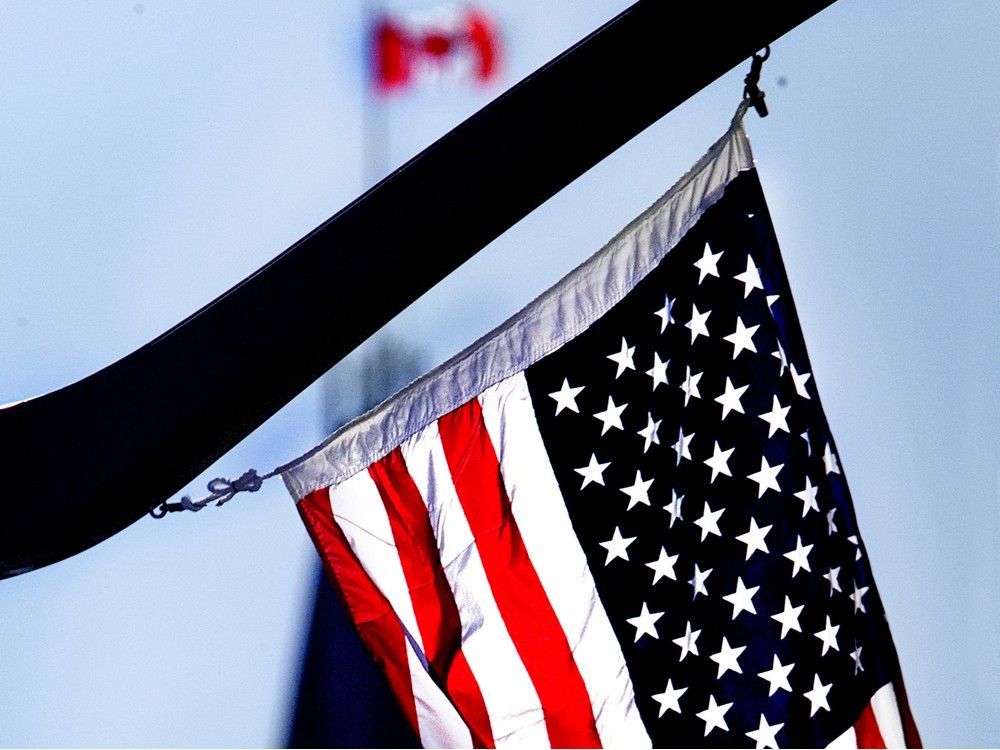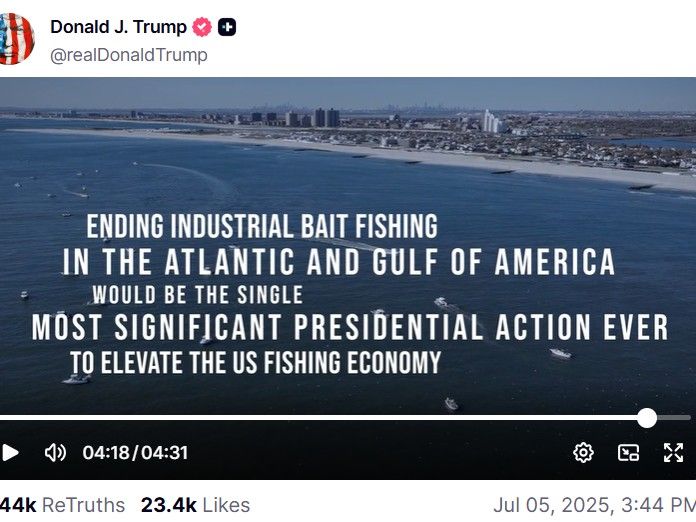
U.S. President Donald Trump has posted a video to social media that takes direct aim at New Brunswick-based Cooke Inc., suggesting it’s “pillaging” fish from American waters.
The video dredges up a fight over the fishing of Atlantic menhaden, a small baitfish, in Chesapeake Bay along the coastline of six east coast states.
The concerns aren’t new. Earlier this year, a U.S. court dismissed a longstanding lawsuit against Cooke over foreign ownership allegations.
And again the company is rejecting claims.
But the new video raises questions of whether the Canadian fishing industry will be Trump’s next target in an ongoing trade war, brought up as an irritant amid negotiations over such issues as Ottawa’s digital service tax or supply management.
“The generations to come will not have fishermen,” states one U.S. fish captain in the video.
“Here we have Canadian exploitation of U.S. natural resources.”
Another U.S. industry representative adds in the video that the fishery is being “pillaged by foreigners.”
“Two-thirds of the total amount of catch for the entire Atlantic coast is being removed by a Canadian company,” another rep continues.
The video, posted to Trump’s Truth Social account, the social media platform he owns, appears to be crafted by the president’s staff.
It highlights a call for executive order from the Trump administration “to end this complete ecological and economic disaster.”
“Ending industrial bait fishing in the Atlantic and Gulf of America would be the single most significant presidential action ever to elevate the U.S. fishing economy,” it states, using the administration’s preferred name for the Gulf of Mexico.
 Donald Trump’s Truth Social Post
Donald Trump’s Truth Social Post
Trump did sign an executive order in April that openly alleged unfair trading practices from foreign partners, though without specifics.
That said, it didn’t say anything directly about ending industrial bait fishing.
It did call for, among several other things, a review of all geographic limits on commercial fishing, including protected areas, within 180 days of the order.
It’s unclear if the video signals new details.
The video posted by Trump doesn’t actually name Cooke, but details past allegations surrounding the company.
Those appeared to be put to bed earlier this year, when a U.S. judge fully dismissed a lawsuit against Cooke that alleged the seafood company was using shell companies to skirt American fishing laws.
It stemmed from Cooke’s purchase of Virginia-based Omega Protein in 2017.
Omega is affiliated with another company, American-owned Ocean Fleet Services and Ocean Harvesters, that operates a menhaden fishery in Chesapeake Bay.
It has a contract to deliver menhaden to Cooke processing plants in New Brunswick.
The initial complaint claimed that Cooke was committing “figurehead fraud” by controlling a fleet of fishing vessels based in the U.S., which would violate U.S. foreign ownership rules and constitute a violation of the False Claims Act.
American laws require 75 per cent of a company fishing in American waters to be U.S.-owned.
If proven true, the Blacks Harbour company would have faced up to $2 billion in fines.
But a U.S. district court judge dismissed the lawsuit entirely after agreeing with Cooke’s argument that fish and fishing licences do not qualify as property, and therefore aren’t subject to ownership rules.
On Tuesday, Cooke spokesperson Joel Richardson acknowledged the video, while referring a request for comment to the U.S. company that owns and operates the menhaden fishery.
In a lengthy statement, Ocean Fleet Services and Ocean Harvesters spokesperson Ben Landry said the video “repeats many false claims.”
“Most notably, it recirculates claims about foreign ownership of the fisheries and the sustainability of menhaden that have been repeatedly debunked,” reads the statement. “The video also ignores the fact that Atlantic and Gulf menhaden fisheries are tightly regulated, responsibly managed and a source of good-paying jobs for hundreds of rural American fishermen and seafood workers.
“As required by U.S. law, all menhaden fishing is conducted by U.S.-owned fishing companies, and vessels are crewed primarily by American fishermen.”
It adds: “Ocean Harvesters is an American company headquartered in Reedville, Virginia.”
Landry confirmed that Ocean Harvesters does have a long-term supply contract with Omega Protein, which, while owned by Canada-based Cooke, Inc., is also headquartered in Reedville.
A push to see the menhaden industry curbed comes, in part, from striped bass fishers in the area.
The Southern Maryland Recreational Fishing Organization originally wrote a letter to Trump in February stating he could “reestablish a $10-billion recreational fishing industry in the United States” with the signing of an executive order ending overharvesting.
The goal would be to see growth in the striped bass population which feeds on menhaden.
But it’s a position that isn’t universally held south of the border, as Maine lobstermen have been critical of any call to end menhaden fishing, noting its lobster fishery is dependent on menhaden to bait thousands of lobster traps off its coast.
The Ocean Fleet Services and Ocean Harvesters statement also addressed overfishing accusations in the video, noting the Atlantic States Marine Fisheries Commission, the interstate body that manages menhaden, “has repeatedly found that the species is not overfished and that overfishing is not occurring.”
“If we truly want to ‘put America first,’ we should be supporting the hardworking Virginians, Louisianans, and Mississippians who comprise the Atlantic and Gulf menhaden fisheries, not attacking them,” it adds.
The United States Department of Commerce didn’t immediately return a request for comment on Tuesday as to whether changes to the menhaden industry are coming as part of Trump’s executive order.
In April, the fear was that the order was targeting another part of New Brunswick’s fishing industry.
While signing the executive order in the Oval Office, Trump claimed the American seafood industry as a whole was “dramatically” overregulated.
That prompted U.S. Commerce Secretary Howard Lutnick to say the U.S. imports more seafood than it exports.
“Can you imagine that? We import seafood, and we have the greatest coasts and fishing in the world,” Lutnick said.
It then spurred Trump to bring up Maine, alleging that Maine lobstermen can’t fish in areas off its coast that Canadian fishermen can.
“The Maine lobster,” Trump said. “You can’t get Maine lobsters…
“So Maine’s forced to go for days out to some other area that’s not as good. We have to free that up, too.”
He added: “Canada fishes there and we’re not allowed to.”
The words appear to be aimed at the disputed waters around Machias Seal Island, a remote, rocky island in the Bay of Fundy off New Brunswick’s southwestern coast. The roughly 550 metre-long and 250 metre-wide island remains in a longstanding sovereignty dispute between Canada and the United States.
There, Americans have accused Canada of operating under a different, more accommodating set of rules that allow them to catch larger lobsters.
Canadians counter that the Americans have higher catch limits and often don’t follow established boundary lines.
Premier Susan Holt expressed concern at the time, questioning Trump’s words.
“As with anything that President Trump says, you have to dig in to try to find the reality in all of it, because often sometimes the rhetoric doesn’t match what is real and what are the rules,” Holt said.
“And so we are working to understand what exactly he’s proposing to do, and whether he can do that, while making sure we have all our ducks in a row so that we can strongly and forcefully defend our interests in that space.”
The executive order specifically called for the U.S. Secretary of Commerce to immediately consider suspending, revising or rescinding regulations that overly burden America’s commercial fishing, aquaculture and fish processing industries.
It also called for a review of all geographic limits on commercial fishing, including protected areas, within 180 days of the order.
That timeline stretches to October.
Meanwhile, there have been questions south of the border both with the legality of the order and its environmental fallout.
“What we do know is executive orders tend to be unlawful and create a lot of chaos,” Conservation Law Foundation Senior Counsel Erica Fuller told CBS news WGME in Portland, Maine.
The Conservation Law Foundation is concerned about the impact of deregulation on endangered species like right whales.
“You still get other whales entangled in weak rope, and they can’t all break free,” Fuller said. “If it becomes a wild west on the water, it’s also going to harm the lobster fishery itself and the coastal communities that depend upon it.”
There’s also the potential that the video presents another twist in ongoing trade deal negotiations where Canada hopes to see current U.S. tariffs removed.
Prime Minister Mark Carney and Trump continue to negotiate, after setting a deadline of July 21.
Last week, Trump abruptly announced the end of those talks, accusing Canada of imposing unfair taxes on U.S. technology companies.
The Carney government then announced it would rescind the tax in order to keep talks going.
That’s as Trump continues to ramp up his objection to Canada’s supply-managed dairy system, complaining about what he characterizes as high tariff rates on U.S. dairy exports to Canada.
He’s now posted this fishing video.
Carney has told reporters in Ottawa rescinding the tax was part of a “bigger negotiation,” though he did not elaborate or say if Canada had received anything in exchange.
Pressed further on how Carney is approaching negotiations with Trump, the prime minister said the “best thing in a negotiation” is that people know what the other party is trying to achieve.
“We’re looking out for the jobs of Canadians not just today, but in the longer term and making it clear to the president, but also Americans, that there’s tremendous opportunity for us working together,” Carney said.